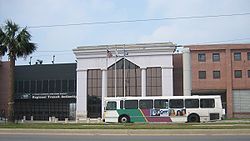| Route Name | Terminal 1 | Terminal 2 | Length | via | notes |
|---|
| 3 Tulane - Elmwood | Downtown
Saratoga + Tulane | Elmwood
Jefferson Hwy + Spur | 10.2 miles (16.4 km) | Tulane Avenue, South Carrollton Avenue, Jefferson Highway | 24-hour service (No evening or overnight service west of Jefferson + Causeway) |
| 8 St Claude - Arabi | Downtown
Main Library | Arabi
St Claude at Parish Line | 5.4 miles (8.7 km) | Rampart Street (Saint Claude Avenue) | 24-hour service |
| 9 Broad - Napoleon | Irish Channel
Napoleon + Tchoupitoulas | New Orleans East
New Orleans East Hub | 14 miles (23 km) | Napoleon Avenue, Broad Street, Chef Menteur Highway | 24-hour service |
| 11 Magazine | Downtown
Tulane + Loyola | West Riverside
Children's Hospital New Orleans | 5.8 miles (9.3 km) | Camp Street, Magazine Street | |
| 27 Louisiana | St. Thomas Dev
Rousseau + St Andrew | Navarre
Orleans + Navarre at Delgado Community College | 7.9 miles (12.7 km) | Tchoupitoulas Street, Louisiana Avenue, Toledano Street (Washington Avenue) | |
| 31 Leonidas - Gentilly | West Riverside
Children's Hospital New Orleans | Gentilly Woods
Gentilly Woods Hub | 12.4 miles (20.0 km) | Leonidas Street, Carrollton Avenue, Gentilly Boulevard | |
| 32 Leonidas - Treme | Downtown
Main Library | 10.5 miles (16.9 km) | Leonidas Street, Carrollton Avenue, Orleans Avenue | |
| 45 Lakeview | Navarre
Cemeteries Transit Hub | 7.5 miles (12.1 km) | Canal Boulevard, Pontchartrain Boulevard | Operates in a loop |
| 51 St. Bernard - Claiborne | St. Bernard
St. Bernard + Senate | Fontainebleau
Claiborne + Carollton | 7.8 miles (12.6 km) | Saint Bernard Avenue, Claiborne Avenue | Late evening service on Claiborne Avenue provided by 53-O Paris - Claiborne Owl |
| 52 Paris - Broadmoor | Lake Terrace/Lake Oaks
University of New Orleans | Dixon
Palmetto + S. Carrollton at Xavier University | 10.5 miles (16.9 km) | Paris Avenue, Washington Avenue | Late evening service on Paris Avenue provided by 53-O Paris-Claiborne Owl |
| 53-O Paris-Claiborne Owl | Fontainebleau
Claiborne + Carrollton | Lake Terrace/Lake Oaks
University of New Orleans | 10.9 miles (17.5 km) | Claiborne Avenue, Paris Avenue | Runs late evening service on portions of Routes 51 and 52 |
| 55 Elysian Fields | Downtown
Main Library | Gentilly Woods
Gentilly Woods Hub | 11 miles (18 km) | Elysian Fields Avenue, Press Drive (SB), Congress Drive (NB) | 24-hour service (No overnight service east of University of New Orleans) |
| 57 Franklin - Freret | Pontchartrain Park
Press + Emmett Bashful at SUNO | Audubon
Audubon Zoo | 12.2 miles (19.6 km) | Franklin Avenue, N Claiborne Avenue, Freret Street, Broadway | |
| 61 Lake Forest - Village De L'Est | Downtown
Main Library | Village De L'Est
Chef Menteur + Old Gentilly at Gulfway Terrace Apartments | 16.1 miles (25.9 km) | I-10, Dwyer Road, Lake Forest Boulevard, Chef Menteur Highway | 24-hour service |
| 62 Morrison - Bullard | New Orleans East
New Orleans East Hub | 13.3 miles (21.4 km) | I-10, Morrison Road, Bullard Road | Overnight service provided by 62-O Morrison Owl |
| 62-O Morrison Owl | 18.2 miles (29.3 km) | I-10, Morrison Road, Bullard Road | Runs overnight service on portions of Routes 62 and 68 |
| 66 Hayne Loop | New Orleans East
New Orleans East Hub | 17.1 miles (27.5 km) | Leon C. Simon Drive, Hayne Boulevard | Operates in a loop |
| 67 Michoud Loop | 17.4 miles (28.0 km) | Lake Forest Boulevard, Bullard Road, Old Gentilly Road, Michoud Boulevard |
| 68 Little Woods Loop | 10.7 miles (17.2 km) | Hayne Boulevard, I-10 Service Road |
| 80 Desire - Louisa | Gentilly Woods
Gentilly Woods Hub | Marigny
Elysian Fields + Decatur | 5.6 miles (9.0 km) | Louisa Street, Desire Street | |
| 84 Galvez - Lower 9th | Downtown
Main Library | Arabi
St Claude at Parish Line | 8.1 miles (13.0 km) | N Galvez Street, N Miro Street | |
| 86 St. Maurice - Chalmette | Arabi
St Claude at Jackson Barracks | Chalmette
Nunez Community College | 13.5 miles (21.7 km) | Tupelo Street, Judge Perez Drive, Paris Road, Fats Domino Avenue | Operates in a loop |
| 91 Jackson - Esplanade | St. Thomas Dev
Rousseau + St. Andrew | Navarre
Cemeteries Transit Hub | 8 miles (13 km) | Jackson Avenue, Esplanade Avenue | |
| 103 General Meyer Local | Downtown
Tulane + Loyola | New Aurora
General Meyer + Carver | 14.3 miles (23.0 km) | Pontchartrain Expressway, L.B. Landry Avenue, General Meyer Avenue | |
| 105 Algiers Local | Gretna
Wilty Terminal | Tall Timbers-Bretchel
Tullis + Woodland | 7.9 miles (12.7 km) | Holiday Drive, Tullis Drive | |
| 114A Garden Oaks - Sullen | Downtown
Tulane + Loyola | New Aurora
General Meyer + Carver | 12.7 miles (20.4 km) | Pontchartrain Expressway, General DeGaulle Drive, Sullen Drive | 24-hour service |
| 114B Garden Oaks - Woodland | Tall Timbers-Bretchel
Tullis + Woodland | 12.7 miles (20.4 km) | Pontchartrain Expressway, MacArthur Boulevard, Woodland Drive | |
| 202 Airport Express | Downtown
Loyola + Tulane | Louis Armstrong International Airport | 15.9 miles (25.6 km) | I-10 | |
|




